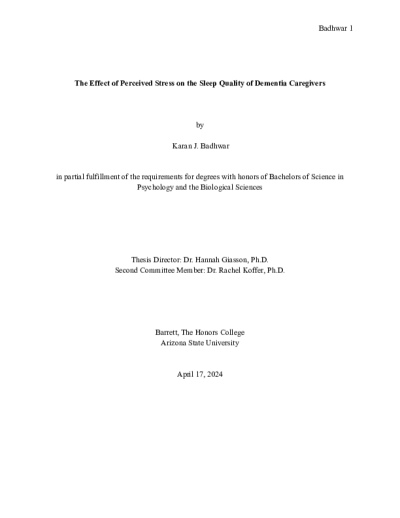Filtering by


The current study investigated emotional language use in middle aged and older adults in interviews in which they were asked questions relating to Alzheimer's disease and related dementias. Participants were split into two groups, one that attended Memory Clinic to have their cognition assessed, representing information seekers, and those who did not attend. These interviews were then transcribed and run through LIWC2015 software to determine linguistic differences between the two groups. Results did not indicate statistically significant differences between language use in those who attended Memory Clinic compared with those who did not. Further study with a sample that has higher levels of anxiety related to Alzheimer's disease and related dementias may produce statistically significant results.
Objective: The purpose of this meta-analysis is to identify if one atypical antipsychotic (risperidone, aripiprazole, olanzapine, clozapine, quetiapine) is more effective in treating behavioral and psychological symptoms of dementia (BPSD). The secondary aim is to identify a difference in dosage between the atypical antipsychotics when used to treat BPSD. Methods: Articles regarding atypical antipsychotics and BPSD were located on the Arizona State University Library website and Google Scholar. A total of 13 studies were included in analyses. The mean difference of the measurement of BPSD from baseline to end of study were extracted from the studies, converted to z-scores using standard error, and the average was found for each medication and placebo groups. Data on dosage was also collected and the total mg of medication for an average participant was calculated based on type of medication. Two ANOVAs were conducted: one to identify a significant difference between the average effect of each medication on BPSD and another to identify a significant difference between the level of dosage given on average for each medication. Results: These analyses indicated that there was no significant difference between individual atypical antipsychotics or placebo (F(5,19) = 0.254, p = 0.932). There was a significant difference in level of dosage with quetiapine having a significantly higher dosage on average than every other medication (F(4,12) = 18.49, p = 0.0000456). Conclusions: There is a lack of evidence that supports the use of atypical antipsychotics for the treatment of BPSD, however, future research that focuses on lower doses of these medications and interactions with psychotherapy may prove beneficial.

This narrative literature review explores how perceived stress affects sleep quality in dementia caregivers by examining various factors. Ten studies from 2013 to 2022 across four continents were analyzed, focusing on caregiver stress levels, sleep quality, caregiver burden, and depression. Higher stress levels were linked to poorer sleep quality, alongside factors like emotional distress and disrupted sleep patterns. The findings highlight the importance of targeted interventions to reduce stress and improve sleep quality among dementia caregivers, suggesting the need for longitudinal and empirical studies with standardized measures for a better understanding.